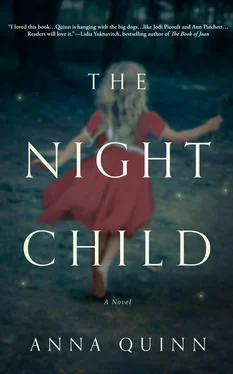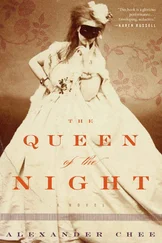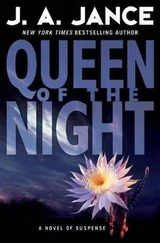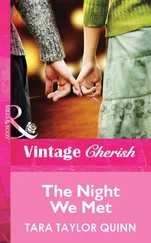CHAPTER TWENTY-NINE: February 17, 1997
It’s been five days since the scream, since she’s had her voice back, and for the first time in thirty years, she feels her voice is hers alone. She sits on a green vinyl couch in the visitor’s room, waiting for Paul. The room, with its vague gray paint, everything stale and smelling of ammonia, isn’t much better than her private room, but at least there isn’t a hospital bed with its insinuation of vulnerability and disorder. And she’d asked that Paul visit in the early afternoon when most of the patients stop screaming and take naps. She wants to reassure him she is not crazy. Her visit with John proved she was stronger, and if she can manage Paul, she knows David and Dr. Brinkley will sign her release papers. She’d brushed her hair, applied lipstick. Smiled at herself in the mirror. I’m ready.
There are only three other people in the room. One person is Carol. She sits in a metal chair by the door, knitting. She is there to make sure things don’t get out of control. The other two people are an old man and an old woman. They sit together on an orange vinyl couch over by the window. The old woman stays in room 404, two doors down from Nora’s room. Nora has seen her rocking in a chair by the window, heard her make low moaning sounds at night. Sometimes the old man sits by her bed and reads to the old woman from the newspaper. Sometimes he holds her hands, kisses her pale lips, and brushes the limp gray hair from her face.
Nora thinks then about the first time Paul said, “I love you.” They were sitting at a greasy linoleum table in Spud’s Fish and Chips at Alki Beach, sipping vanilla milkshakes and dipping french fries in ketchup. “I love you,” he’d said, holding a fry to her lips, and she’d opened her eyes wide. They’d known each other less than a year, and she knew he liked to date around, liked to keep things “uncomplicated”—keep his options open.
She’d chewed up the french fry, tried to swallow it, but it seemed to swell in her throat, her tongue thick with salt, and she had to gulp her milkshake in order not to choke. She licked her lips, almost said, “Why?” but ended up saying nothing at all because she didn’t know what to say. She knew she should say, “I love you,” back, but she couldn’t because what did she know about love? She’d never been in love before, never felt the way the women in books and movies seemed to feel when they were in love, and she didn’t feel that way now. Or at least she didn’t think she did. It was hard to know.
“Did you hear me?” he’d asked, slightly embarrassed.
“Yes, yes, I did. Sorry.”
“Am I too prosaic for you? Too commercial?”
He was always asking her this. Always wondering if they were a good fit because she loved poetry and he hated it, except for the rhyming kind.
“Am I,” he’d said again. “Am I too staid for you?”
She shrugged, ate another fry.
“I could try and be a poet, but I’d probably blow it,” he said.
She laughed, fed him a fry. Let him lick the salt from her fingers.
“You’re different than the others,” he’d said then.
She squirted some ketchup onto her plate, swirled a french fry around in it, and ate it.
“You don’t care about a lot of things most women waste time over—you know, like clothes and jewelry and hair,” he said. “You’re beautiful—in a really natural way.” And she’d thought then of that tampon commercial, that one with the make-up free girl hiking up a mountain even though she was having her period. Tampons for the all-natural, adventurous woman. She’d never felt natural like that woman. She’d never felt natural at all.
“And as long as we’ve known each other,” he said, “I’ve never seen you freak out over stupid little things—you know, like if I’m a few minutes late or something—I’ve never seen you freak out at all.” He’d emptied his milkshake, wiped his mouth on his sleeve. “I like that about you. I really do.”
They’d looked at each other for a long moment before he said, “I shouldn’t have said something so important in a fish-and-chips dive. Shit, I’m sorry.” He’d taken her hand, wiped a bit of ketchup off her finger with a napkin. “I’ll say it again later. Somewhere romantic, okay?”
And several weeks later, during a candlelight dinner at his apartment, Pachelbel playing on the stereo, he’d said it again, gazing at her, his face soft with affection, and she’d said it back to him. She’d felt a strong affection for him in that moment, an affection that might have been love. Sitting together like that with champagne and caviar, all on a white tablecloth, it did feel like a scene in a movie, and for the first time that she remembered, she’d felt normal, she’d felt hope that she was normal. Also, she thought it might be nice to be with someone.
“Nora?”
It’s Paul. He stands there. He looks handsome. He’s wearing a down jacket she hasn’t seen before, and jeans instead of khakis. She rises to her feet, uncertain, says a slightly embarrassed hello. She realizes he will see her differently now. And she’s right. His face is a mixture of shock and sympathy. Has she changed that much? She knows her weight has dropped, she’s felt the sunken space between her hipbones, but she made an effort this morning to put on make-up and change out of her robe into a T-shirt and jeans.
“How are you?” he says, walking over to her. Close up, she can see the bags under his eyes, the dark circles of exhaustion.
“Better. I’m better.”
They sit down, stiff and awkward on the green vinyl couch. Uncomfortable silence.
“You have your voice back,” he says.
“Yeah.”
“And you made it through Valentine’s Day?”
“Yes,” she says, blushing, thinking about John. Then, “Is Fiona okay?”
“She’s okay, but she’s worried about you. Asks about you all day. We’ve told her you’re getting better, that you were just really tired and needed a rest.” He crosses his arms, hands dig into armpits. “God, what you’ve been through.”
“I’m better.” Her eyes sting and she doesn’t know what else to say. She doesn’t want to say the wrong thing. He is acting so careful.
He tells her he’s sorry he hasn’t visited, explains how he’d been nervous to—that he might have made things worse, might have undone the work she was doing here. And then he says, a darkness passing over his face, his voice thick with pain, “Did you really think I could hurt Fiona?”
“I didn’t—”
“But you did. Dr. Forrester said that a part of you—Margaret,” he stops for a moment, looks down, looks so embarrassed that a flash of humiliation rips through Nora’s chest. A normal man sitting with a crazy woman in a psych ward. He meets her eyes again. His eyes wet with tears. “Margaret said that I … I … might have hurt Fiona.”
“But did he tell you why—that she doesn’t trust any men,” Nora swallows, then adds, “except for him.”
“But she’s you , right? She is you. So at some level, you thought I could hurt our daughter.”
She wants a pillow to clutch, but there isn’t one. Her hands tremble so badly she sits on them. She is frightened by her shame, ashamed of her accusations. She doesn’t want to float away.
Carol issues a warning cough, glares at Paul, asks, “Everything okay?”
“Fine,” Nora says. Carol’s voice is an anchor, reminding her how badly she wants to go home. She moves her hands to her lap. Folds them. They are still trembling, but once they are folded together, it isn’t as noticeable. Breathe in calm, breathe out reason. You can do this.
Читать дальше












